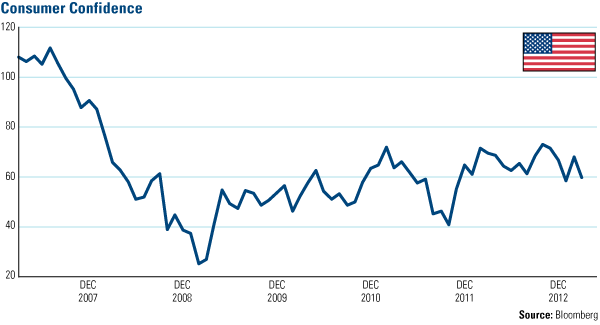The Economy and Bond Market Radar (April 1, 2013)
Treasury yields fell for the third week in a row following continued uncertainty in Europe, even though a revised plan for Cyprus was put in place and banks reopened on Thursday to relative calm. Economic data was generally weaker than expected, which also likely played a role in sending yields lower. A good example is consumer confidence which came in well below estimates and somewhat surprisingly has just bounced around in a range for more than a year. Beginning-of-the-year tax increases and the sequestration continue to weigh on consumer confidence.
Strengths
- Europe avoided a larger crisis by coming to a resolution on the Cyprus banking system, but the process does not instill a lot of confidence.
- The Case-Shiller 20-city price index rose 8.1 percent versus a year ago in January. Signs that the housing market continues to recover are very supportive of continued economic expansion.
- Durable goods orders rose 5.7 percent in February on a spike in aircraft orders.
Weaknesses
- Consumer confidence fell sharply in March as the economy lacks alacrity.
- Eurozone economic sentiment also fell in March after seeing steady improvement in recent months.
- Initial jobless claims rose to 357,000 this week, reversing a recent trend of better numbers.
Opportunity
- The Fed continues to remain committed to an extremely accommodative policy.
- Key global central bankers are still in easing mode such as the European Central Bank (ECB), Bank of England and the Bank of Japan. The Bank of Japan in particular appears willing to implement additional monetary policy easing in the near future.
Threat
- The economy appears to be gaining momentum. The risk for bondholders is that this trend continues and bonds sell off.
- Inflation in some corners of the globe is getting the attention of policy makers and may be an early indicator for the rest of the world.












